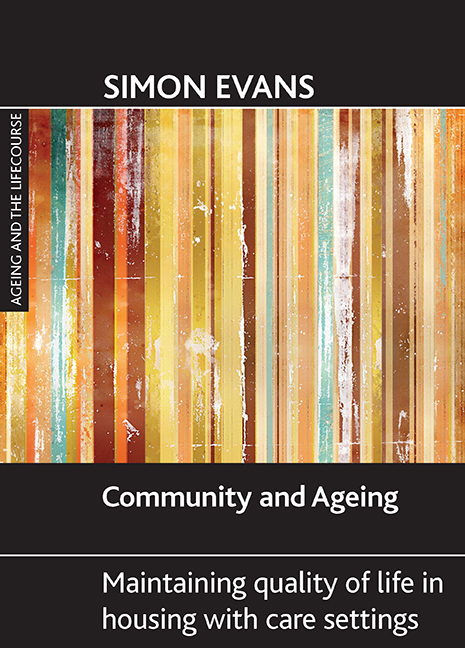Book contents
- Frontmatter
- Contents
- List of tables, boxes and photos
- Acknowledgements
- Foreword
- one Introduction
- two What is community?
- three Community and ageing
- four Housing with care communities in the UK
- five An international perspective on retirement villages
- six Promoting a sense of community in housing with care settings
- seven Diversity, community and social interaction
- eight Changing communities and older people
- nine Conclusion
- Appendix
- References
- Index
- Frontmatter
- Contents
- List of tables, boxes and photos
- Acknowledgements
- Foreword
- one Introduction
- two What is community?
- three Community and ageing
- four Housing with care communities in the UK
- five An international perspective on retirement villages
- six Promoting a sense of community in housing with care settings
- seven Diversity, community and social interaction
- eight Changing communities and older people
- nine Conclusion
- Appendix
- References
- Index
Summary
1: Opening doors to independence: a longitudinal study exploring the contribution of extra care housing to the care and support of older people with dementia
Authors: Sarah Vallelly, Simon Evans, Tina Fear and Robin Means
Published in 2006 by Housing 21, London
Funded by the Housing Corporation and Housing 21
The main aim of this study was to evaluate the contribution that extra care housing can make to the long-term care and support of people with dementia. The longitudinal design incorporated a mixed methodology, combining a quantitative component that tracked 103 people with dementia in extra care housing with an indepth qualitative element that focused on six diverse extra care schemes as case study sites. The case studies involved over 125 interviews with tenants with dementia, their relatives, care staff, other tenants and senior managers from local health and social care partner organisations. In addition, a range of local and regional policies and strategies were analysed in relation to each of the six schemes.
Findings
For the tenants and relatives interviewed in this study, independence was one of the most highly valued aspects of living in extra care housing. Three elements of the extra care environment emerged as particularly important in supporting independence for people with dementia:
• the freedom to come and go within and beyond the housing scheme;
• maximising opportunities to ‘do things’ for themselves;
• having choices about how to spend their time.
Conclusion
This study demonstrated that independence is one of the most important elements of quality of life for people with dementia living in extra care housing. A range of factors in the physical, social and care environments should be considered in order to maximise independence. Good design of individual apartments and communal areas, the provision of appropriate activities and the availability of flexible care and support were all found to be important. However, the interaction between such factors can be complex. For example, providing social activities can only help encourage social contact if tenants can easily get to such events. For tenants with dementia this requires design that is dementia friendly and accessible and, for some, requires staff being available to escort them.
- Type
- Chapter
- Information
- Community and AgeingMaintaining Quality of Life in Housing with Care Settings, pp. 135 - 140Publisher: Bristol University PressPrint publication year: 2009

